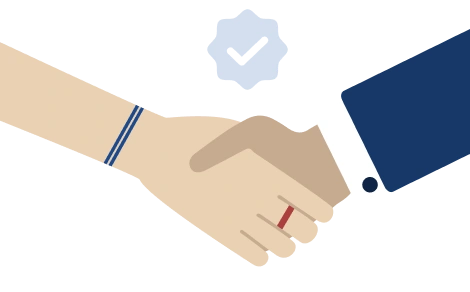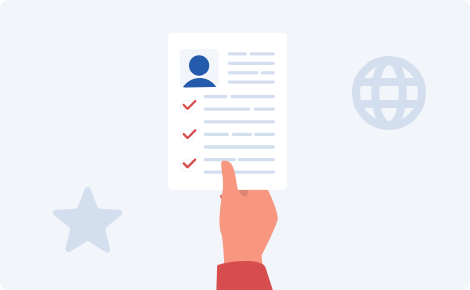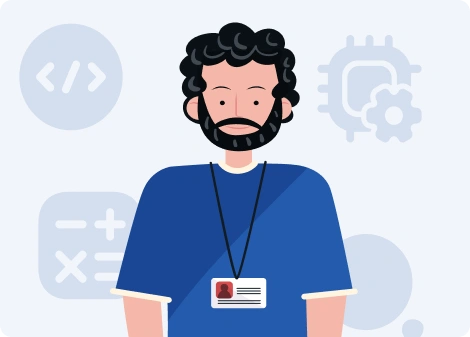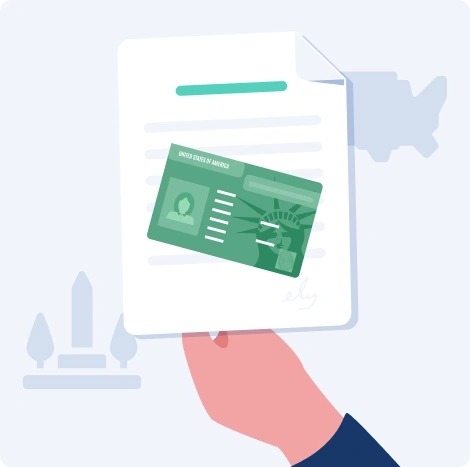Visas
Flexible visa solutions for
your immigration needs
you given your particular immigration needs and timeline

USA visa guide: Everything you need to know
Welcome to our comprehensive guide about USA visas. Different types of visas available, an array of requirements to be met, and a complex application methodology may be the cause for you to feel overwhelmed. You are not one among them alone. People usually find the application process of visa perplexing and too stressful. We'll make things easier for you. We'll walk you through all that you want to know so you can approach your visa application with confidence and ease. Let's get started!
USA visa types
The USA offers so many visas for different needs and situations. Let's
break down some common ones and what they really mean for you:

Business and investor visas for the USA
Learn about E-2 and EB-5 investment visas to help you live and work in the U.S. Discover requirements, documentation, and application procedures. Our resources guide you through the E-2 and EB-5 process, from...

Employment-based green card options
Know all options for employment-based green cards, such as the EB-2 NIW and EB-1A cases. Understand the qualifications and procedures to obtain U.S. visas reserved for foreign-born talent. Our fully detailed resources...

U.S. work visa opportunities
Find the best options of U.S. working visas for temporary workers that fit your needs and requirements. Learn what the requirements are, how much the application fee will be, and how long it takes to...

Student visas in the U.S.
Check our all-encompassing student visa page if you're considering the move to the United States for studies. Learn about these different types of student visas, such as F-1 and J-1, and discover what requirements and eligibility criteria are...

US tourist visa
Know all the important information about acquiring a United States tourist visa in our detailed guide. We walk you through requirements, necessary documents, and eligibility criteria on one comprehensive page. Understand how to apply, the related costs...
Application process
Applying for a USA visa is a multistep process.
Breaking it down, here's what you can expect:
The consular officer is required to know why you came to visit the USA and whether or not you are qualified for a visa, so ensure you present all documents, your financial statements if you have any, and an invitation letter invited by someone living in the United States, showing that you also have a tie at your home country. You shall seriously prepare for this interview. Respond honestly, clearly, and to the point. Do practice your responses to common questions and all possible documentation required for presentation.
If your visa application is denied, don't be discouraged. Understand the reasons for the denial, address any issues, and consider reapplying. Seeking advice from immigration experts or legal professionals can provide additional guidance and support throughout this process. They can help you understand the specific reasons for the denial and offer strategies to improve your application.
First of all, you have to fill in an online application for a visa. You will then need to pay an application fee for your visa and to arrange an interview with the US Embassy or Consulate in your country. Be sure that while filling out the DS-160 form, you choose the right category for which you apply since it provides the questions and documents required accordingly. Questions will be addressed concerning your travel plans and background during the interview with an interviewing officer.
Visa processing times vary, with some applications taking several weeks or even months. It's good to apply well in advance of your planned travel date. In some instances, additional administrative processing might be required for some visas to be issued. This could be caused by factors on an orderly basis like when you share the same name with someone being sought after towards security issues or when one works in a sensitive field.
Persistence and preparation are the keys to successfully going through a US visa application process. If you know how the different types of visas, requirements, and procedures for applying go hand in glove with your eligibility, then the probability of success will be very high, be able to enjoy many benefits of traveling or being a citizen in the USA.
Application process
Applying for a USA visa is a multistep process.
Breaking it down, here's what you can expect:
First of all, you have to fill in an online application for a visa. You will then need to pay an application fee for your visa and to arrange an interview with the US Embassy or Consulate in your country. Be sure that while filling out the DS-160 form, you choose the right category for which you apply since it provides the questions and documents required accordingly. Questions will be addressed concerning your travel plans and background during the interview with an interviewing officer.
The consular officer is required to know why you came to visit the USA and whether or not you are qualified for a visa, so ensure you present all documents, your financial statements if you have any, and an invitation letter invited by someone living in the United States, showing that you also have a tie at your home country. You shall seriously prepare for this interview. Respond honestly, clearly, and to the point. Do practice your responses to common questions and all possible documentation required for presentation.
Visa processing times vary, with some applications taking several weeks or even months. It's good to apply well in advance of your planned travel date. In some instances, additional administrative processing might be required for some visas to be issued. This could be caused by factors on an orderly basis like when you share the same name with someone being sought after towards security issues or when one works in a sensitive field.
If your visa application is denied, don't be discouraged. Understand the reasons for the denial, address any issues, and consider reapplying. Seeking advice from immigration experts or legal professionals can provide additional guidance and support throughout this process. They can help you understand the specific reasons for the denial and offer strategies to improve your application.
Persistence and preparation are the keys to successfully going through a US visa application process. If you know how the different types of visas, requirements, and procedures for applying go hand in glove with your eligibility, then the probability of success will be very high, be able to enjoy many benefits of traveling or being a citizen in the USA.
USA visa requirements
The requirements to obtain a US visa vary depending on the kind of visa one is
seeking, but generally some common things should be taken notice of.
Investor visa
When it comes to an investment visa, an EB5 visa, or an E2 visa, not just an employer but financial investment of the required amount and proof of its legitimate source are needed. You would also have to draw up a detailed business plan showing how your investment will support US-based jobs and hence support its economy.

Tourist visa
This tourist visa will require that you be able to prove your self-sufficiency while in the country and strong ties binding you to your homeland. This could include having a fixed job, ownership of property, family, or any other various commitments that would bring you back home at the end of the trip.

Student visa
For obtaining a student and exchange visitor visa, proof of admission to a US educational institution, proof of sufficient finances to support oneself while studying or on an exchange program in the US, and possibly an academic transcript and standardized test scores will be needed. You will also need to be able to prove you do not intend on emigrating to the United States and plan on continuing your life at home once you graduate or complete your studies/exchange.

Work visa
If you are applying for a work visa, then a potential employer can prove to be really helpful. He would need to provide letters of offer for employment, details of what you will do, how much you will get paid, and maybe even proof that they found no suitable candidate from the USA for the particular job. You will have to provide your undergraduate degree or equivalent years of relevant experience in order to apply for an H1B category visa.

Green Card
The employment-based green card provides a pathway to permanent residency in the United States for foreign workers. To qualify, applicants must have a permanent job offer from a U.S. employer and, for most categories, the employer must obtain a labor certification from the Department of Labor to demonstrate that no qualified U.S. workers are available for the position. The employer must also file Form I-140, Immigrant Petition for Alien Worker, on behalf of the employee. Applicants must fall under one of the preference categories (EB-1, EB-2, EB-3, etc.) and meet the specific qualifications required for the job, including education and experience.

Meeting these requirements and collecting all the documents will definitely
make your application process easier and lead you towards success.
Common challenges
Visa success tips
Proving intent to return
One of the hardest obstacles is proving your intent to return to your home country after your stay in the USA. The applicant has to convince the consular officer that he indeed has no intention of staying in the United States as an overstay resident. Most times this involves strong ties to the native land, including a steady job, property, or family obligations that will compel their return.
Financial stability
Another common problem is the proof of financial stability. Applicants have to show that they will comfortably sustain themselves while in the USA. This comes by providing bank statements, proof of income, and sponsorship letters from sponsoring authorities. The financial documents must be updated and clear that the applicant is in a capacity to afford the trip.
Preparing for the visa interview
Many applicants have found it challenging to prepare for an interview that will merit them a visa. Preparing the applicants to answer questions on their itinerary and background is a must. In searching for facts, the consular officer will need as much detailed information as possible regarding the purpose of the travel, your plans while in the United States, and how you plan to support yourself during your stay.
Organizing documents
Keeping all documents in order is very important. Applicants should bring their passport, printable visa application confirmation page, receipt for payment of visa fee, and supporting documents of proof of finances or the inviting one. It is recommended to prepare copies of them, in case the interviewing officer would prefer to keep one document.
Language barriers
Language barriers can pose a significant challenge during the visa application process. Applicants who are not fluent in English may find it difficult to communicate effectively with the consular officer, potentially leading to misunderstandings or incomplete responses. It is important to seek assistance from a translator or a knowledgeable friend if necessary to ensure clear communication during the interview.
Strong ties demonstrated
You have to prove to the consular officer that you will go back to your country of origin. Show him any strong tie like having a steady job, property, or commitment towards family members in your home country. If you own a house, carry with you the title deed or lease agreement. If you work, carry a letter from your employer indicating that you're expected back from your journey.
Making ready for the interview
Be prepared to respond to questions about your trip and background. Answer all the questions openly, clearly, and concisely. Well, have the relevant information ready in advance—for example, the reason to travel, your intentions in the US, and support during your stay—so that you respond confidently when interviewed.
Organizing documents
Keep all the papers in an orderly manner and ready somewhere: your passport, visa application confirmation page, payment of the visa fee, and supporting documents, say, financial account or letters of invitation. It would be very nice to have copies of everything as well.
Addressing denials and seeking professional help
Do not despair if, at any time, your visa application is denied. Find out why and, if possible, take note of how the said points were resolved in your future application. Additional help and understanding can also be sought from immigration experts or legal practitioners. They can help you identify the precise reasons for the refusal and even help you to identify how best you can counter such during your application. Just recall, persistence and proper preparation are the secrets to moving through the visa acquisition process.
Double-check all information
Before submitting your application, double-check all the information for accuracy. Ensure that names, dates, and other details match across all documents. Even small errors can lead to delays or denials. Carefully review your application and supporting documents to make sure everything is correct and consistent.
Common challenges
Proving intent to return
One of the hardest obstacles is proving your intent to return to your home country after your stay in the USA. The applicant has to convince the consular officer that he indeed has no intention of staying in the United States as an overstay resident. Most times this involves strong ties to the native land, including a steady job, property, or family obligations that will compel their return.
Financial stability
Another common problem is the proof of financial stability. Applicants have to show that they will comfortably sustain themselves while in the USA. This comes by providing bank statements, proof of income, and sponsorship letters from sponsoring authorities. The financial documents must be updated and clear that the applicant is in a capacity to afford the trip.
Preparing for the visa interview
Many applicants have found it challenging to prepare for an interview that will merit them a visa. Preparing the applicants to answer questions on their itinerary and background is a must. In searching for facts, the consular officer will need as much detailed information as possible regarding the purpose of the travel, your plans while in the United States, and how you plan to support yourself during your stay.
Organizing documents
Keeping all documents in order is very important. Applicants should bring their passport, printable visa application confirmation page, receipt for payment of visa fee, and supporting documents of proof of finances or the inviting one. It is recommended to prepare copies of them, in case the interviewing officer would prefer to keep one document.
Language barriers
Language barriers can pose a significant challenge during the visa application process. Applicants who are not fluent in English may find it difficult to communicate effectively with the consular officer, potentially leading to misunderstandings or incomplete responses. It is important to seek assistance from a translator or a knowledgeable friend if necessary to ensure clear communication during the interview.
Visa success tips
Strong ties demonstrated
You have to prove to the consular officer that you will go back to your country of origin. Show him any strong tie like having a steady job, property, or commitment towards family members in your home country. If you own a house, carry with you the title deed or lease agreement. If you work, carry a letter from your employer indicating that you're expected back from your journey.
Making ready for the interview
Be prepared to respond to questions about your trip and background. Answer all the questions openly, clearly, and concisely. Well, have the relevant information ready in advance—for example, the reason to travel, your intentions in the US, and support during your stay—so that you respond confidently when interviewed.
Organizing documents
Keep all the papers in an orderly manner and ready somewhere: your passport, visa application confirmation page, payment of the visa fee, and supporting documents, say, financial account or letters of invitation. It would be very nice to have copies of everything as well.
Addressing denials and seeking professional help
Do not despair if, at any time, your visa application is denied. Find out why and, if possible, take note of how the said points were resolved in your future application. Additional help and understanding can also be sought from immigration experts or legal practitioners. They can help you identify the precise reasons for the refusal and even help you to identify how best you can counter such during your application. Just recall, persistence and proper preparation are the secrets to moving through the visa acquisition process.
Double-check all information
Before submitting your application, double-check all the information for accuracy. Ensure that names, dates, and other details match across all documents. Even small errors can lead to delays or denials. Carefully review your application and supporting documents to make sure everything is correct and consistent.
Benefits of getting a US visa
Getting a U.S. visa is an entrance to many other opportunities. Be it tourism, education, work, or just reunification with family members, the USA visa opens up new horizons and experiences in one of the most varied and energetic countries on earth.
Investor visa
Family visas could be the key to rejoicing and building a life with your family in one of the most prosperous countries on earth. You may be joining a spouse, parent, or child; in any case, these family visas can potentially guide you along the road toward permanent residence and all the way to citizenship. The EB5 and E2 visas provided by the USA offer, in juxtaposition with residency in this country, unique opportunities to invest in the US economy. It requires an investment of either $1,050,000 in a new commercial enterprise or $800,000 in all other targeted employment areas for an entrepreneur holding an EB5 visa. This should be invested in creating ten full-time jobs for American workers.
While the EB5 visa grants an alien the right to live and work in the USA, it ultimately paves your way toward a green card and citizenship. The E2 visa is for investors from countries with which the USA has a treaty of commerce and navigation. You have to be making an investment considered by US business as being of a sufficient amount to play a crucial role in the running of business activities.
Whereas there is no minimum investment amount defined for an E2 visa, unlike the EB5 visa, it should be significant to support the business. The E2 visa is renewable indefinitely as long as the business continues to operate successfully.
Green card
An employment-based green card offers numerous benefits, including permanent resident status, allowing individuals to live and work anywhere in the United States. It provides employment flexibility, enabling holders to change employers without affecting their immigration status after fulfilling initial employment conditions.
Tourist visa
A USA visa shall help tourists to view some outstanding landmarks that include the Grand Canyon, Times Square, and the Golden Gate Bridge. You can move around with cities famous like New York and Los Angeles, Chicago, and feel for yourself the diversity of various cultures this nation possesses. It has got absolutely everything for everybody from the beauty of national parks to theme parks.
Student visa
For students, studying in the USA can provide access to world-class educational institutions like Harvard, Stanford, and MIT. You'll have the opportunity to study under top professors, engage in cutting-edge research, and become part of campus life.
An F1 visa allows optional Practical Training for practical experience, leading to the opportunity to work in your chosen field of studies for up to a year or more if you happen to get into one of the targeted STEM fields. These professionals holding a USA work visa can leverage the dynamic job market and innovative industries of the country. The USA is home to leading companies in Technology, Finance, Healthcare, etc.
Moreover, this experience one gains by working in the USA helps boost their career prospects with this valuable international exposure.
Work visa
A work visa offers several benefits, including the legal authorization to work in the United States for a specific employer. It allows individuals to gain valuable work experience and skills in a U.S. setting, which can enhance their professional development and career prospects. Work visa holders often have the opportunity to apply for permanent residency (Green Card) if they meet certain criteria.
Additionally, many work visas allow for the inclusion of dependents, enabling family members to accompany the visa holder to the United States.

Ready to begin your visa journey
Knowing how to get a US visa can quite make a big difference in your application journey. When well prepared and knowledgeable about the kinds of visas, requirements, and steps for application, you stand at higher chances of success and have many benefits that come with traveling or living in the USA. In case of any questions or further assistance, do not feel shy to post your query to the experts at hand ready to assist you through every step. Bring your dream of coming to the USA into reality. Contact us today and take the first step toward that exciting journey.